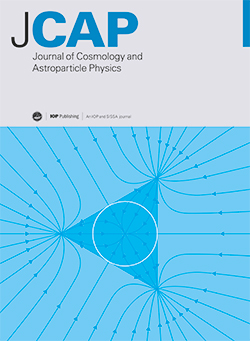Constraining small-scale primordial magnetic fields from the abundance of primordial black holes
IF 5.9
2区 物理与天体物理
Q1 ASTRONOMY & ASTROPHYSICS
Journal of Cosmology and Astroparticle Physics
Pub Date : 2024-12-05
DOI:10.1088/1475-7516/2024/12/012
引用次数: 0
Abstract
The presence of magnetic fields in the early universe affects the cosmological processes, leading to the distinct signature, which allows constraining their properties and the genesis mechanisms. In this study, we revisit the method to constrain the amplitude of the magnetic fields on small scales in the radiation-dominated era from the abundance of primordial black holes. Constraints in the previous work were based on the fact that the density perturbations sourced by stronger magnetic fields become large enough to gravitationally collapse to form PBHs. However, we demonstrate that this picture is incomplete because magnetic fields also increase the threshold value of the density contrast required for PBH formation. The increase in threshold density contrast is more pronounced on smaller scales, and in extreme cases, it might even prevent PBH production despite the presence of significant magnetic field. Taking into account the relevant physical effects on the magnetized overdense region, we establish an upper-limit on the amplitude of comoving magnetic fields, approximately 0.13-0.15 μG at a scale of 1017Mpc-1. Additionally, we compare our constraints with various small-scale probes.将小尺度的原始磁场与大量的原始黑洞隔离开来
早期宇宙中磁场的存在影响了宇宙过程,导致了独特的特征,从而限制了它们的性质和形成机制。在这项研究中,我们重新审视了从原始黑洞的丰度来约束辐射主导时代小尺度磁场振幅的方法。先前工作的限制是基于这样一个事实,即由较强磁场引起的密度扰动变得足够大,以至于引力坍缩形成pbh。然而,我们证明这幅图是不完整的,因为磁场也增加了PBH形成所需的密度对比度的阈值。阈值密度对比的增加在较小的尺度上更为明显,在极端情况下,尽管存在显著的磁场,它甚至可能阻止PBH的产生。考虑到磁化过密区的相关物理效应,我们建立了一个共动磁场振幅的上限,在1017Mpc-1的尺度下约为0.13-0.15 μG。此外,我们将我们的约束与各种小规模探针进行了比较。
本文章由计算机程序翻译,如有差异,请以英文原文为准。
求助全文
约1分钟内获得全文
求助全文
来源期刊

Journal of Cosmology and Astroparticle Physics
地学天文-天文与天体物理
CiteScore
10.20
自引率
23.40%
发文量
632
审稿时长
1 months
期刊介绍:
Journal of Cosmology and Astroparticle Physics (JCAP) encompasses theoretical, observational and experimental areas as well as computation and simulation. The journal covers the latest developments in the theory of all fundamental interactions and their cosmological implications (e.g. M-theory and cosmology, brane cosmology). JCAP''s coverage also includes topics such as formation, dynamics and clustering of galaxies, pre-galactic star formation, x-ray astronomy, radio astronomy, gravitational lensing, active galactic nuclei, intergalactic and interstellar matter.
 求助内容:
求助内容: 应助结果提醒方式:
应助结果提醒方式:


